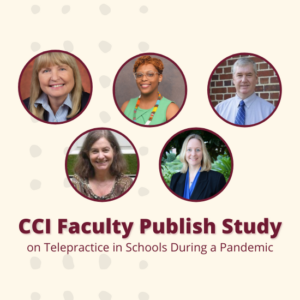In December of 2021, faculty members from Florida State University’s College of Communication and Information published a paper titled, “Providing Telepractice in Schools During a Pandemic: The Experiences and Perspectives of Speech-Language Pathologists.” Authors Shannon Hall-Mills, Lakeisha Johnson, Melissa Gross, Don Latham, and Nancy Everhart created this study to share the perspectives of speech-language pathologists in regard to educational tools during the pandemic.
“The sudden shift to all remote learning in schools in 2020 and the challenges that brought to public education was the initial inspiration for this particular topic,” said Hall-Mills, Ph.D., Director of the SPEAR lab and Assistant Professor at FSU. “At the onset of the COVID-19 pandemic, schools struggled to shift to remote learning for all students and to online service delivery for students with disabilities.”
The research team is comprised of two speech-language pathology researchers and three researchers from the School of Information, made possible by a grant from FSU’s COVID-19 Collaborative Collision Seed Fund program.
During the pandemic, Hall-Mills found her teaching experience changed when assisting graduate students, often altering the course load to better fit the new challenges her students were facing. She said, “while all of this began occurring two years ago, there continues to be a necessity for course instructors and research supervisors to engage a fluid and flexible dynamic for students and faculty whose lives are variably affected on any given day by the circumstances of the pandemic.” The focus groups selected for the study shared similar difficulties, with a main issue being lack of preparation for remote learning and lack of resources.
Hall-Mills hopes “that readers come away with an understanding of how dedicated the speech-language pathologists were and how hard they worked in a very challenging situation to support the students at their schools.” In this pandemic, telecommunication technology is vital for sustaining educational opportunities; the broad scope of speech-language pathology stresses the importance of school systems partnering with others for support and shared resources during this time. “Telepractice is here to stay, and I’m grateful that programs like ours have shifted to meet the needs of the up-and-coming workforce and engage in research to support the use of Telepractice to improve the quality of life of individuals who need communication therapies.”
For more info on this research team and their study, click here.

